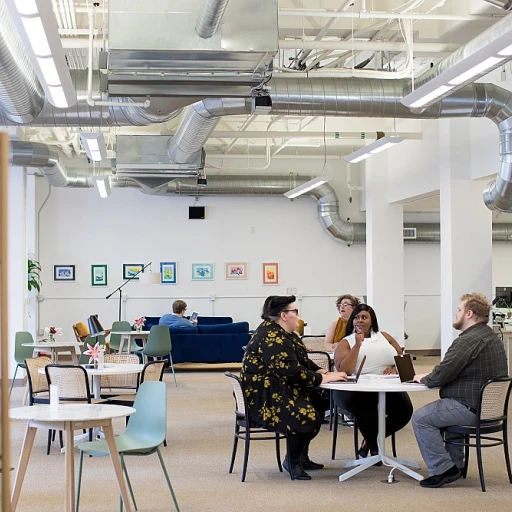
Understanding AI's Role in HR
Leveraging AI to Revolutionize Workforce Dynamics
Artificial intelligence is becoming an integral part of how businesses approach human resources, particularly when it comes to employee engagement. In an ever-evolving business landscape, organizations strive to create a thriving company culture where employees feel valued and engaged. AI plays a pivotal role in these efforts by providing innovative solutions to enhance workplace dynamics and increase employee engagement levels.
AI technology enables HR managers to develop and implement action plans that cater to the diverse needs of the workforce. Its capabilities extend to analyzing communication patterns and providing insights that help teams improve collaboration and performance. By harnessing AI, companies can not only measure employee satisfaction but also drive engagement organization-wide.
Integrating AI into Engagement Strategies
AI tools empower organizations by delivering data-driven insights that inform engagement strategies. For instance, AI can process data from employee surveys to gauge job satisfaction, identify areas of concern, and suggest personalized training or development paths. This actionable feedback allows managers to take timely actions to foster a more engaged and productive workforce.
Moreover, advanced AI systems facilitate team building by analyzing interactions among team members, offering recommendations for improving teamwork. The insights derived from AI help shape the internal business processes and policies, ensuring they align with employee values and contribute to a positive work life balance.
Enhancing Predictive Analytics for Better Outcomes
The adoption of AI in HR goes beyond immediate needs; it supports long-term improvements in employee engagement. AI-driven predictive analytics enable HR departments to foresee potential challenges in employee experience and intervene proactively. This approach ensures that employees remain engaged and committed to the organization’s mission.
An abundance of resources are available for organizations looking to improve employee engagement through AI. For a deeper exploration of how HR AI tools are transforming employee engagement, consider visiting the detailed article on AI's impact on HR.
AI Tools for Employee Engagement
Optimizing Engagement Through Innovative AI Tools
Incorporating artificial intelligence into human resources to elevate employee engagement is an evolving strategy that organizations are embracing. These AI tools are reshaping how companies connect with their workforce, aiming to enhance cultural alignment and drive performance. Using advanced technologies, companies are deploying innovative solutions to create a more engaged employee base.
One essential aspect AI tools focus on is how employees feel about their work environment. By utilizing AI algorithms, businesses can gather feedback in real-time through sentiment analysis derived from employee surveys and communication platforms. This immediate data helps managers to proactively adjust engagement strategies rather than waiting for traditional end-of-year reviews. These insights can lead to actionable plans that resolve workplace issues swiftly, improving the overall job satisfaction of team members.
AI-driven platforms are also pivotal in fostering a better workplace culture by aligning individual goals with broader company values. Custom-tailored development and training modules can now be designed to meet each employee’s needs, making their work more enriching and relevant, thus promoting long-term engagement. Engaged employees are more likely to exhibit heightened workplace performance and contribute positively to the organization.
An increasing trend is using AI to create robust feedback loops promoting a culture of continuous improvement. Through AI-led analysis, managers can receive recommendations on how to bolster team building and improve communication, which fosters a symbiotic employer-employee relationship. As a result, organizations can fine-tune their strategies to consistently enhance engagement levels across the board.
For those interested in diving deeper into frameworks for success, consider researching how AI strategies can amplify success here. These insights could pave the way to revolutionizing your company's internal culture and employee experience.
Personalizing Employee Experiences with AI
Creating Tailored Workplace Experiences
Personalizing employee experiences has emerged as a cornerstone of modern human resource management. Organizations that leverage Artificial Intelligence in this realm are better equipped to understand and cater to individual employee needs, thereby boosting engagement levels and fostering a positive company culture. AI-driven tools analyze vast amounts of data to discern patterns and trends in employees' preferences, behaviors, and engagement touchpoints.
AI technologies enable a level of personalization that was previously unachievable. By examining data from employee surveys, performance metrics, and feedback systems, AI can provide actionable insights into how employees feel about their work environment. With these insights, companies can tailor engagement strategies, training programs, and development opportunities to align with the workforce's unique values and aspirations.
Customizing Communication Channels
Communication is crucial for creating a well-connected workforce. AI solutions can help personalize how communication is structured within a team, ensuring that each team member receives information in ways that resonate best with them. For instance, some employees may prefer regular updates through email, while others might find real-time messaging apps more engaging.
Moreover, AI tech can assist in measuring employee engagement by analyzing communication patterns. It provides managers valuable insights into how team members interact with one another and with the organization. This knowledge can be instrumental for crafting effective communication strategies that ensure all employees remain informed and engaged.
Enhancing Job Satisfaction Through Personalized Learning
Personalized learning experiences fuel professional development and job satisfaction. Through AI-driven training platforms, employees can access customized development plans that align with their long-term career goals. This approach not only nurtures skill development but also helps increase employee retention by satisfying individual's growth aspirations.
Companies committed to improvement may find it beneficial to create an action plan for boosting employee retention by addressing personal development needs. This proactive approach facilitates a thriving work life environment where engaged employees are more likely to feel valued and committed to their company's mission.
AI-Driven Feedback and Recognition Systems
Revolutionizing Feedback and Recognition
In the evolving landscape of human resources, AI-driven feedback and recognition systems are becoming indispensable tools for enhancing employee engagement. These systems are designed to create a more dynamic and responsive work environment, where employees feel valued and motivated.
AI can analyze vast amounts of data to provide real-time feedback, allowing managers to address issues promptly and effectively. This timely communication fosters a culture of transparency and trust within the organization. Employees, in turn, feel more connected to the company’s values and mission, which can significantly improve employee engagement levels.
Enhancing Communication and Team Dynamics
AI tools facilitate better communication between team members and managers by providing insights into team dynamics and individual performance. This can lead to more effective team building and collaboration, as managers can tailor their engagement strategies to meet the specific needs of their workforce.
Moreover, AI-driven systems can help measure employee engagement through surveys and feedback mechanisms, offering actionable insights that can be used to develop an engagement action plan. This ensures that the organization is continuously working towards improving employee experience and job satisfaction.
Implementing Best Practices for Long-Term Success
To maximize the benefits of AI in feedback and recognition, companies should adhere to best practices that align with their business goals and company culture. This includes regular training for managers on how to effectively use AI tools and integrating these tools into the organization's long-term development plans.
By focusing on continuous improvement and adapting to the changing needs of their workforce, organizations can create a more engaged and motivated team, leading to increased performance and productivity. Engaged employees are more likely to contribute positively to the company culture, driving the organization towards long-term success.













